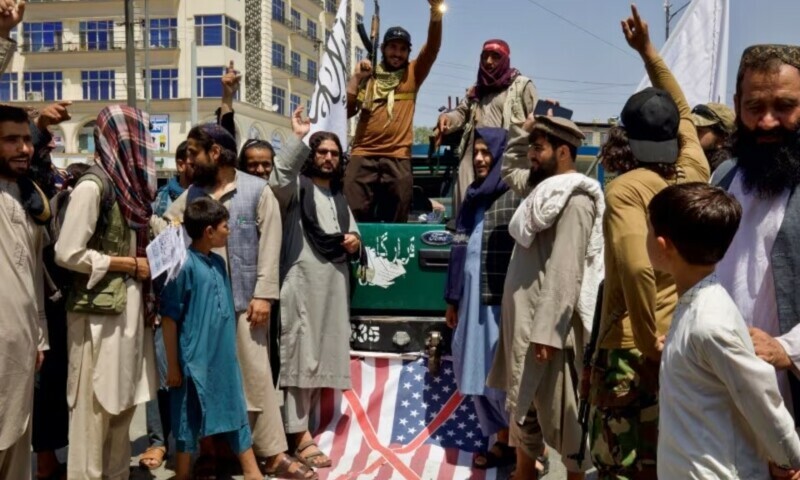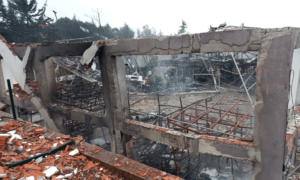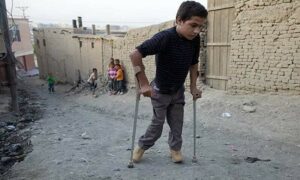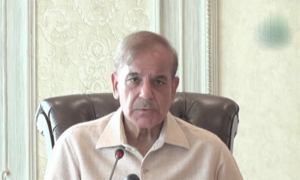After the sudden shift to Sharia law under the first Taliban regime was met with Western backlash, Afghanistan’s rulers now moving gradually to tighten their hold.
Mainstream and social media platforms were flooded with criticism earlier this month after an Afghan envoy sparked controversy by remaining seated when Pakistan’s national anthem was played at a ceremony in Peshawar.
The Foreign Office was quick to condemn the incident, terming it “reprehensible disrespect” and contrary to “diplomatic norms”. The Afghan Consulate in Peshawar, on the other hand, downplayed it and clarified that Hafiz Mohibullah Shakir, the diplomat in question, chose not to stand due to the presence of “music in the anthem”.
“If there were no music, I would have stood and placed my hand on my chest. There was no intention to disrespect the Pakistani nation,” said the Afghan consulate general’s spokesman in a statement.
Just days later, a similar incident was also reported in Iran where a visiting Afghan official “disrespected the country’s national anthem by not standing”. In response, an Iranian foreign ministry statement said a “strong protest” had been lodged after the Afghan official’s “unconventional and unacceptable action”.
Standing up during the national anthem is a widely practised gesture of respect in many countries, often seen as a way of honouring the nation and its values.
For the Taliban though, the gesture does not align with their rooted interpretation of Sharia, as highlighted by the recent incidents and the Afghan government’s response. The Taliban, whether as insurgents or de facto rulers, remain unapologetic and rigid in adhering to their ideology, prioritising their beliefs over even the most fundamental diplomatic norms.
Undergoing a ‘cleansing process’
In recent years, the Taliban’s incumbent regime has adopted a gradual shift towards the implementation of Sharia law. The new approach, however, contrasts with their previous stint in power from 1996 to 2001 when they enforced Islamic laws soon after seizing Kabul, igniting widespread international outrage.
Senior Taliban officials, particularly those responsible for overseeing the implementation of Sharia laws, have repeatedly hinted at an ongoing “cleansing process” aimed at erasing Western-influenced policies of the past two decades. The pro-Western Afghan republic, under the leadership of former presidents Hamid Karzai and Ashraf Ghani, championed such policies.
This “cleansing process” targets topics such as education, women’s empowerment, media and modernity — an indication that systematic efforts are underway to undo progressive reforms and align Afghanistan with the Taliban’s stern interpretation of Sharia law.
The Taliban’s entire interpretation of Islamic laws and vision of the Islamic Emirate is shaped by their adherence to the Sunni Hanafi Deobandi school. Deobandism profoundly influences their political ideology, guiding supreme leader Haibatullah Akhunzada’s decisions on Sharia law, education, women’s rights, and governance.
If this trend continues with the same intensity, Afghanistan may also become a hub for producing influential Deobandi scholars in the region. Afghan clerics, associated with this school of thought, are already seen asserting their religious credentials with more freedom and autonomy in a Taliban-led Afghanistan.
On the whims of Kandahar
The Afghan Taliban leadership is currently divided into two key power strongholds: Kabul and Kandahar.
Kabul serves as the political and diplomatic capital of the Islamic Emirate of Afghanistan (IEA), with a focus on international engagement, development projects, economic management and security.
In contrast, Kandahar operates as the spiritual capital, overseeing religious matters, including enforcing strict Sharia laws. Sitting in the south, at a distance of 500 kilometres from the capital, it keeps a close eye on both the public and the Kabul-based government for violations of Sharia law and takes decisions on punishments, terminations or reassignments.
It is therefore no surprise that Kandahar is home to key personalities who have in recent days shaped the Taliban’s decisions. Supreme leader Akhunzada, Chief Justice Abdul Hakim Haqqani, Minister for Propagation of Virtue and Prevention of Vice Khalid Hanafi, Minister for Justice Abdul Hakim Sharayee, Minister of Higher Education Neda Mohammad Nadeem and a circle of influential religious scholars dominate the Emirate’s decision-making process and convey their decrees to Kabul for implementation.
“No matter what the pressure, we will implement Sharia in Afghanistan,” Akhundzada had said in his October 2022 speech.
Opposing views
However, two factions within the Taliban have opposing views on the provision and deprivation of fundamental rights to deprived Afghans.
Taliban Deputy Foreign Minister Sher Mohammad Abbas Stanikzai — once a prominent figure in the Taliban’s Doha negotiation team and a media favourite due to his multilingual communication skills — openly opposes the ban on girls’ education today, for which he has been sidelined from key posts one time too many.
“This is everyone’s right. This is the natural right which God and the Prophet (PBUH) have given to them; how can someone take this right from them?” Stanikzai had said at a graduation ceremony in Kabul last year. “If anyone violates this right, this is an oppression against the Afghans and the people of this country. Try to reopen the doors of the educational institutions for everyone.”
On the other hand, Taliban commander and religious hardliner Neda Mohammad Nadeem has doubled down on banning women’s education after assuming charge as the education minister. He replaced Abdul Baqi Haqqani, who had refused to ban women from universities. Although no official reason was given for the removal, ministry officials claimed it was due to Haqqani’s public criticism of the decree banning girls’ education.
A few other important figures had also initially criticised the ban on girls’ education, including Taliban Interior Minister Sirajuddin Haqqani, but they later chose to remain tight-lipped over the issue fearing backlash from Kandahar.
In a meeting with UN humanitarian chief Martin Griffiths in January last year, Haqqani had even said that the ban on girls’ education was not permanent. “The clash of opinion on the current education system is resolvable,” he added.
Moral policing
Last month, the Taliban’s Ministry of Justice introduced a sweeping new morality law, titled Qanoon e ‘Amr b’il Ma’ruf wa Nahi An al-Munkar (Law of Propagation of Virtue and Prevention of Vice), sanctioned by supreme leader Akhundzada.
The 114-page decree imposes restrictions on various aspects of life, including women’s appearance and behaviour, celebrations, transportation, shaving and music. The law enforces regulations on women, mandating full-body and face coverings and prohibiting loud speech, poetry recitation and public singing. Men are also subject to rules regulating beard length and attire.
The vice and virtue law further bars practices and symbols deemed un-Islamic, including traditional and popular Persian festivals like Nowruz and Shab-e-Yalda, which are considered incompatible with Sharia law. The law also bans the use of “non-Sharia symbols” such as the cross and necktie, labelling them contradictory to Islamic teachings.
It sets out graduated punishments that the morality police are empowered to dole out, from verbal warnings to threats, fines and detentions of varying lengths.
The new decree shows a shift in the behaviour of the Taliban morality police, marking a departure from the tactics employed during their first rule — a moderate approach focusing on preaching and persuasion has now replaced controversial public beatings and humiliation.
Recently, an interesting post appeared on Taliban-linked social media accounts claiming that the authorities have banned promotional signboards in foreign languages across Afghanistan. According to these accounts, the ban is already being enforced in Jalalabad where shopkeepers are now covering or painting English signage in their stores.
Offsetting Western critique
To offset Western criticism of the Taliban’s implementation of Sharia law, the government appears keen on cooperating on security and narcotics — some of the most important issues for the West and Afghanistan’s neighbours.
The Taliban are aware that countries bordering Afghanistan have questionable human rights records, media freedom and political rights — Pakistan being a case in point ranking 164th on a list of 193 countries on the UN Human Development Index. The Afghan government has thus cunningly exploited the security concerns of regional countries and the international community to their advantage.
The international community finds common ground with the Taliban in two crucial areas: counter-terrorism efforts against the banned terrorist group Islamic State Khorasan Province (ISKP) and the Taliban’s anti-narcotics campaign, which aims to eradicate drug production and trade in Afghanistan.
In April 2022, Akhundzada issued a decree banning the cultivation, production and trafficking of narcotics. “Transporting, selling, trading, importing and exporting of all types of other drugs, such as alcohol, heroin, shisha, tablet K, hashish and all other types of drugs, as well as drug-producing plants, is forbidden,” it said.
With the ban, Afghanistan, once a leading supplier of illicit drugs, has seen a remarkable 95 per cent decline in drug cultivation, according to estimates by the United Nations Office on Drugs and Crime (UNODC).
Meanwhile, the Taliban’s successful operations against the ISKP, the regional branch of the Islamic State, have particularly positioned them as a potent partner in counter-terrorism efforts against the militant ISKP, which has emerged as a significant threat both regionally and globally.
Header image: Members and supporters of the Taliban stand on a US flag as they hold a rally to mark the third anniversary of the fall of Kabul, in Kabul, Afghanistan, August 14, 2024. — Reuters







